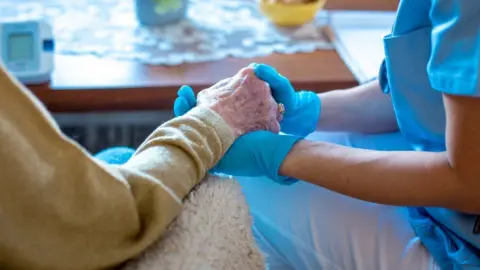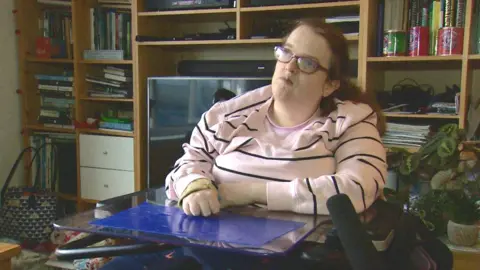Care workers 'not adequately valued or rewarded'
 Getty Images
Getty ImagesCare workers are not adequately valued or rewarded for their vitally important role, a new report from Scotland's spending watchdogs has said.
It said the poor terms and conditions for staff contributed to recruitment difficulties, rising sickness absence and high vacancy levels.
The report said the "crisis" in the social care workforce needed to be addressed urgently.
It said it was putting the quality of care services at a considerable risk.
The report, from the Accounts Commission and the Auditor General for Scotland, warned of "huge challenges facing the sustainability of social care" but said the pace of change had been slow.
First Minister Nicola Sturgeon said there was "an urgent need for reform" of social care, with extra investment in services and pay as well as plans for a National Care Service.
The report said changes could not wait for the National Care Service, which ministers aim to have up and running by the end of the current parliament in 2026.
More than £5bn is spent annually on social care such as care at home for older people and disabled people and those in care homes.
The watchdog report said there needed to be a shift in how this money was used, with greater emphasis on preventative care.
It warned that increased demand and an ageing population meant tighter criteria were being used for who was eligible for care, leaving more unmet need.
Recruitment and retention
The Audit Scotland report said that the 209,690 staff, mainly female, working in social care in Scotland were under immense pressure, and the sector faced ongoing challenges with recruitment and retention.
It cited surveys of staff which showed that almost a quarter leave within the first three months and 88% of providers said recruitment was problematic.
About 78% of home care workers and 74% of care home workers reported they frequently did not have enough time with clients to deliver compassionate and dignified care.
Three-quarters reported they frequently had to do training in their own time.
The report said that 20% of workers were not on permanent contracts and 11% were on zero-hour contracts.
The average hourly pay was £9.79 last year. The Scottish budget in December 2021 announced that this would rise to a minimum of £10.50.
Last year, the Feely report on adult social care also said workers were undervalued and noted that trade unions had called for a minimum rate of £15 per hour.
It backed the implementation of Fair Work principles to improve conditions and called for a national training body.
 Getty Images
Getty ImagesAt Holyrood, Ms Sturgeon told MSPs that she welcomed the report but said that "I don't think it tells us anything that we haven't all been aware of".
She said the findings were largely in line with those of Derek Feeley's review, and it was why the government was moving to establish a National Care Service.
The first minister said: "We recognise the need for action immediately, we are taking action and we are working with partners to attract more people into the sector.
"We will continue to make the investments that attract people in that sector and invest more in that sector as we take forward the longer-term reform of a National Care Service."
The report from the spending watchdog said plans for a new care service were at an early stage, adding that "some things cannot wait".
"A clear plan is needed now to address the significant challenges facing social care in Scotland based on what can be taken forward without legislation, which could provide strong foundations for an NCS," the report said.

'I don't want my mum doing it'

Kate Walsh, 29, has cerebral palsy and has needed care all her life.
She currently has carers in just a couple of days a week.
Her morning routine involves the carers helping her to get out of bed, get dressed and helping to make her breakfast.
They also take her out and about, to the cinema, shopping or to her drama or football club, as well as putting her to bed.
Up until about six months ago, as well as carers, she was able to employ personal assistants (PAs) about her own age to support and help her in the way she wanted it.
However, after they moved on, Kate's mother has been unable to find replacements so she has had to fill the big gaps in Kate's care.
As Kate now has no-one helping her in the evenings her mum has to lift her into bed every night and deal with all the equipment. She also has to do the morning routine on the days where no carers are coming in.
"I would rather have PAs or carers coming in to help me because I don't want my mum doing it," she said.
"I've had a lot of carers over the years where it hasn't worked out for whatever reason. I just want carers that understand me, that build a relationship with me, that understand what my needs are and let me make my own decisions.
"I just want to be treated like everybody else that's 29."

'Heroic staff'
Scottish Conservative social care spokesman Craig Hoy said the report should be a "wake-up call" for ministers.
He said "heroic staff" were being overwhelmed and now was not the time to centralise care services.
"Instead of pressing ahead with a wholesale bureaucratic overhaul of services, ministers must engage with carers, staff and those who need support to ensure the highest level of care is being delivered," he said.
Scottish Labour leader Anas Sarwar said the report had delivered a "stark warning about the risks we face".
He said: "A workforce ignored, overstretched, and undervalued. Those in need of care at home neglected and struggling to cope. Unpaid carers, disproportionately women, carrying the burden of this government's failures.
"We have been calling for a National Care Service for over a decade, but it can't now be used as a government slogan to delay action until 2026. Carers and those who need the care can't wait another four years."
'Just a number'
Lib Dem leader Alex Cole-Hamilton said improving pay and conditions would be crucial to the future of social care and warned that the SNP's forthcoming centralisation of services would make the situation worse.
GMB Scotland secretary Louise Gilmour said: "If you want a properly resourced social care sector, then you must confront the understaffing crisis.
"The only way to retain and recruit the people and skills to do that is to value them properly. For GMB, that means a £15 an hour social care minimum."
Shona Thompson, GMB convener for the Health and Social Care Partnership at Glasgow City Council, told BBC Scotland: "This is a low-paid workforce that has never been recognised or valued for the service they give.
"These workers can't wait another five years before the staffing levels are resolved - we need recruitment now but we need to make it inviting so we can get more workers back into this industry before it's brought lower on its knees.
"These carers feel like they're just a number now. They're not treated like individuals."
